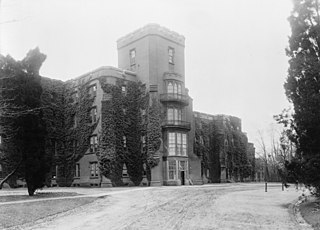
A psychiatric hospital, also known as a mental health hospital, or a behavioral health hospital, is a specialized medical facility that focuses on the treatment of severe mental disorders. These institutions cater to patients with conditions such as schizophrenia, bipolar disorder, major depressive disorder, and eating disorders, among others.

St. Elizabeths Hospital is a psychiatric hospital in Southeast Washington, D.C. operated by the District of Columbia Department of Mental Health. The hospital opened in 1855 under the name Government Hospital for the Insane, the first federally operated psychiatric hospital in the United States.

Dartmouth–Hitchcock Medical Center (DHMC), the flagship campus of the Dartmouth Health system, is the U.S. state of New Hampshire's only academic medical center. DHMC is a 507-inpatient bed hospital and serves as a major tertiary-care referral site for patients throughout northern New England. As an academic medical center, DHMC offers primary, specialty and subspecialty care as well as education and research in partnership with the Geisel School of Medicine at Dartmouth, one of America's oldest medical schools, as well as the Thayer School of Engineering at Dartmouth and The Dartmouth Institute for Health Policy & Clinical Practice.

IWK Health is a major women's and children's (pediatric) hospital and trauma centre in Halifax, Nova Scotia that provides care to maritime youth, children and women from Nova Scotia, New Brunswick, Prince Edward Island and beyond. The IWK is the largest facility in Atlantic Canada caring for children, youth and adolescents, and is the only Level 1 pediatric trauma centre east of Quebec.
Chinook Regional Hospital is the district general hospital for the City of Lethbridge and Southern Alberta, and offers many of the health care services for Alberta Health Services. The hospital services a population of over 150,000 and is supported by the Chinook Regional Hospital Foundation.

Georgia's state mental asylum located in Milledgeville, Georgia, now known as the Central State Hospital (CSH), has been the state's largest facility for treatment of mental illness and developmental disabilities. In continuous operation since accepting its first patient in December 1842, the hospital was founded as the Georgia State Lunatic, Idiot, and Epileptic Asylum, and was also known as the Georgia State Sanitarium and Milledgeville State Hospital during its long history. By the 1960s the facility had grown into the largest mental hospital in the world. Its landmark Powell Building and the vast, abandoned 1929 Jones Building stand among some 200 buildings on two thousand acres that once housed nearly 12,000 patients.

The Dartmouth General Hospital is an acute care hospital in Dartmouth, Nova Scotia, Canada.

Emergency Health Services (EHS) is a branch of the Nova Scotia Department of Health tasked with providing emergency medical services. It is also responsible for transportation of patients between hospitals and medical facilities. At present, all ground ambulance and air ambulance service in Nova Scotia is contracted by EHS to Emergency Medical Care (EMC), a subsidiary of Medavie Health Services.

British Columbia Children's Hospital is a medical facility located in Vancouver, British Columbia, and is an agency of the Provincial Health Services Authority. It specializes in health care for patients from birth to 16 years of age. It is also a teaching and research facility for children's medicine. The hospital includes the Sunny Hill Health Centre, which provides specialized services to children and youth with developmental disabilities aged birth to 16 years.

Queen Elizabeth II Health Sciences Centre, in Halifax, Nova Scotia, Canada, is a large teaching hospital and Level 1 Trauma Centre affiliated with Dalhousie University. The QEII cares for adult patients. Pediatric patients within the region are cared for at the IWK Health Centre. Administratively, the QEII is part of the Nova Scotia Health Authority.

Lanchester Road Hospital is a mental health facility located in County Durham, England, and lies on a large site just north west of Durham city. It is managed by the Tees, Esk and Wear Valleys NHS Foundation Trust.

Kingsley Green is a mental health and learning disability site located in Hertfordshire, England, just southeast of the village of London Colney.

John Hunt is an Irish citizen who was involuntarily detained as a psychiatric patient. The conditions of Hunt's detention have been the subject of a sustained campaign by his former partner and mother of his child Gráinne Humphrys. He was committed as an involuntary psychiatric patient in 2005 and was detained at a secure psychiatric unit at Our Lady's Hospital in Cork until August 2011 when he was transferred to the Central Mental Hospital, Dundrum, Dublin. Until 2010 he was not granted leave for any temporary release from the Cork facility to visit his family. As a result of the campaign of his former partner that year, the Cork hospital allowed Hunt six hours of unsupervised leave every two weeks. Later, following a violent altercation with a psychiatric nurse, this leave was rescinded, and Hunt was transferred to the main Irish forensic psychiatric unit in Dundrum.
North East London NHS Foundation Trust (NELFT) is an NHS foundation trust which provides mental and community health services. It runs Foxglove Ward, Goodmayes Hospital and Sunflowers Court in Ilford, Phoenix House in Basildon, Heronwood & Galleon Inpatient Facility in Wanstead, Grays Court Community Hospital in Dagenham, and Hawkwell Court in Chingford. Altogether it operates from more than 150 sites.
Bell Let's Talk is a campaign created by the Canadian telecommunications company, Bell Canada, in an effort to raise awareness and combat stigma surrounding mental illness in Canada. It is the largest corporate commitment to mental health in Canada. Originally a five-year, $50 million program to create a stigma-free Canada and drive action in mental health care, research, and the workplace, Bell Let's Talk was renewed in 2015 for five years with a target of committing $100 million, and in 2020, the initiative was renewed for a further five years, and a commitment of $155 million. The most prominent part of the initiative is "Bell Let's Talk Day," an annual one-day advertising campaign held in late-January where money is donated to mental health funds based on the number of social media and communication interactions that include the branded hashtag, #BellLetsTalk, or its Canadian French equivalent, #BellCause.

Hope for Wildlife (HFW) is a non-profit wildlife rehabilitation and education centre located on a farm in Seaforth, Nova Scotia, Canada. It was founded by Hope Swinimer in 1997 as The Eastern Shore Wildlife Rehabilitation and Rescue Centre. It got its current name in 2006. A television series, Hope for Wildlife, began documenting the centre's efforts in 2009.

Tatchbury Mount Hospital is a health facility to the north of Totton, Hampshire, England. It is owned and managed by Southern Health NHS Foundation Trust and acts as the Trust's headquarters. The site was formerly a large psychiatric hospital with the majority of the buildings on the site dedicated to this purpose, however in recent years changes in the management of these patients has resulted in the uses for the site diversifying.
Twin Oaks Memorial Hospital is a Canadian public hospital in Musquodoboit Harbour, Nova Scotia, a rural community in the Halifax region. Originally opened as the Twin Oaks War Memorial Hospital in 1950, and reconstructed in 1976, the hospital is operated by the Nova Scotia Health Authority and has a 24-hour emergency department.















